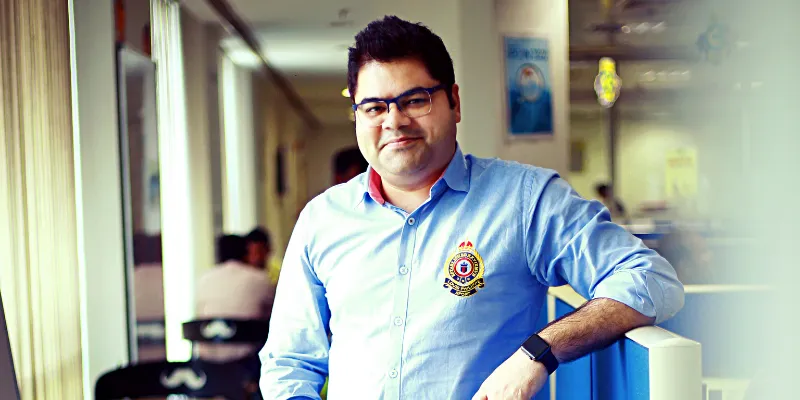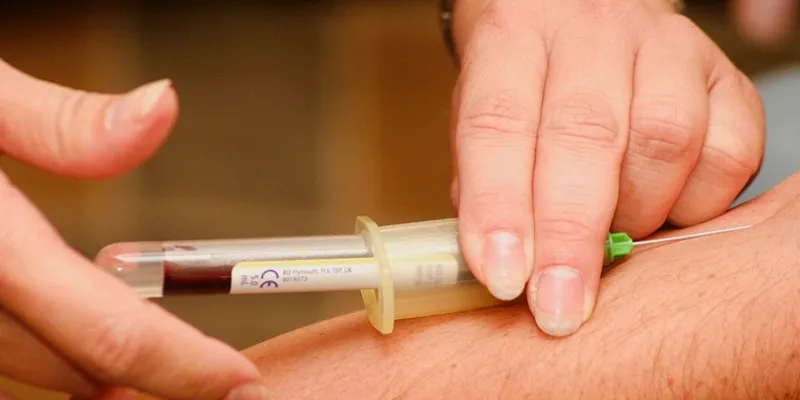Why this Yuvraj Singh-backed healthtech startup is looking at diagnostics as a B2C model
Healthians is an online diagnostics startup through which diagnostic centres reach the consumer’s home. So why did the Yuvraj Singh-backed Delhi-NCR startup decide to go down the B2C road?
All of us know that one diabetic who unfortunately also has a sweet tooth and not much self-control. The common refrain in such situations is, “No problem, I will take that extra shot of insulin or dose of medicine.”
When it comes to health and healthcare, India, culturally, remains reactive, just like the example above. We respond to events and problems after they have happened.
This was something serial entrepreneur Deepak Sahni realised early on, and understood the need for a proactive healthcare system in place.
With two successful exits in healthcare information technology and medical tourism under his belt, healthcare for Deepak still remains a primary focus because he believes the industry needs multiple solutions.
This led him to start Healthians, an online diagnostics startup in Delhi-NCR in 2014. The team began operations with funding from cricketer Yuvraj Singh’s YouWeCan Ventures in 2015. Healthians has so far raised $4.25 million, of which $250,000 was seed money.
“Healthians is not a marketplace or an aggregator, but we work with partner labs. We manage processes, quality, and operations for these labs and tightly control them over 250 quality checkpoints. Unlike aggregators, at any given point in time, we know exactly what is happening with our customer’s samples,” says Deepak.

Healthians Founder Deepak Sahni is a serial entrepreneur and was intrigued by the idea of having a proactive healthcare system in place.
Revenue growth and B2C model
Healthians ended the first year of its operations with a revenue of Rs 1.1 crore and by FY18, this touched Rs 40 crore. The team claims it will reach 250 percent growth this financial year with a revenue of Rs 100 crore.
In the past year, the startup grew over 200 percent and also launched its operations in South India.
Healthians works on a B2C model. The platform offers trained phlebotomists and precision-driven labs to ensure accuracy and perfection in tests.
The customers book their tests through the app, phone, or website and the Healthians phlebotomists collect the sample from their homes as per their convenience. The samples are sent to certified labs and reports are made available within 24 hours. But Healthians did not start off on the B2C model.
Why shift to B2C?
“We started as a pure marketplace for diagnostics, but it soon became apparent that our lab partners, including some of the bigwigs in the industry, were ill-equipped to provide a reliable, consistent, and quality service,” says Deepak.
He explains that the logistics in the business is a challenge for many and there is a strong dependency on franchisees. “Therefore, compromise on quality was out of the question and that is when we decided to change our model to B2C and take full control of the entire process,” adds Deepak.
He says they realised that the entire health ecosystem of India is based on a reactive approach, rather than a proactive one.
In India, the diagnostic space is traditionally B2B and dependent upon franchise and doctors’ network to reach customers, which means again that they only target people who are already ill.
Deepak believes, in a country where more than 50 percent of the population is below 25 years of age, a reactive approach to healthcare will cost us $4.5 trillion for management of diseases.
“This sort of in-depth analysis of the market helped us determine that our value proposition would be a cost-effective, standardised and accurate diagnostic service that would enable them to lead healthier lives.”
The team started with the logistics part and reworked the model to include 50 checkpoints. The process took six months to set in place. “Once done, we worked for another six months to control quality in the labs through standardisation, technology, and quality processes,” adds Deepak.
Beyond tests, customers are informed of future health trends along with medical recommendations, dietary and lifestyle advice on the basis of test reports, medical history and lifestyle inputs.

The diagnostics industry in the country is quite disorganised with no standardisation in testing process and methods.
(Image: Hush Naidoo on Unsplash)
Bringing method into a disorganised sector
However, the diagnostics industry in the country is quite disorganised with no standardisation in testing process and methods, which results in a vast disparity in both results and pricing.
“We have also faced challenges related to accuracy because of low awareness among customers about the prerequisites of testing, specifically about the diet or any medications they might be on, which impact the final result,” says Deepak.
He adds, “Another issue is that sometimes the quality of the sample gets compromised due to unforeseen circumstances, the samples become hemolysed or lipemic, rendering them useless for testing. Healthians rejects such samples as it goes against our quality policies. However, most labs use them because otherwise they face a loss of revenue.”
The price range for a full body check-up at Healthians starts at Rs 999 and can go up to Rs 3,500. Certain specialised checkups are in the range of Rs 1,999-Rs 9,999. Most of the routine checkups, including diabetes, lipid, kidney, and thyroid profiles are in the range of Rs 999-Rs 1,299.
The tests available include full-body checkups covering kidney and liver function test, lipid profile, diabetes panel with HbA1c and type 1.5 diabetes test, vitamin profile, and all tests for thyroid. Apart from this, packages to test anaemia, typhoid, stomach infections, male and female hormones, antenatal care, PCOD, and heart care are also available.
The market and future
According to Research and Markets, the diagnostic services market is expected to continue growing at 27.5 percent in the next five years. This growth is likely to be driven by improving healthcare facilities, medical diagnostic and pathological laboratories, private-public projects, and the health insurance sector.
Through its proprietary concepts such as CoolSure, Health Karma, SmartPrik, Health Tracker, and AI-based reports, the team believes Healthians is different as it focuses on managing the diagnostic report and is a mix of tech and human customisation.
Speaking of the company’s future plans, Deepak says, “We expect to have at least 40 labs under our brand by next year, as we establish ourselves across the country. We aim to add over 200 labs and 3,000 phlebotomists across 30 cities over the next 12-18 months. We already have over 600,000 households on the platform and hope to double our customer base by 2020.”










